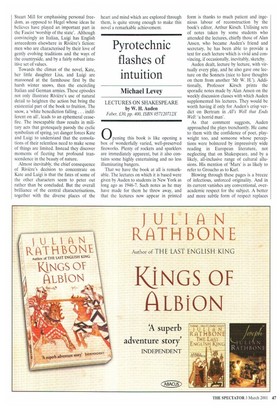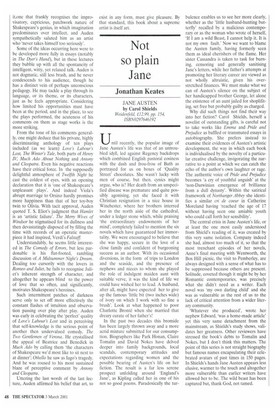Pyrotechnic flashes of intuition
Michael Levey
LECTURES ON SHAKESPEARE by W. H. Auden
Faber, i30, pp. 400, ISBN 057120712X Opening this book is like opening a box of wonderfully varied, well-preserved fireworks. Plenty of rockets and sparklers are immediately apparent, but it also contains some highly entertaining and no less illuminating bangers.
That we have the book at all is remarkable. The lectures on which it is based were given by Auden to students in New York as long ago as 1946-7. Such notes as he may have made for them he threw away, and that the lectures now appear in printed form is thanks to much patient and ingenious labour of reconstruction by the book's editor, Arthur Kirsch. Utilising sets of notes taken by some students who attended the lectures, chiefly those of Alan Ansen, who became Auden's friend and secretary, he has been able to provide a text for each lecture which is vivid and convincing, if occasionally, inevitably, sketchy.
Auden dealt, lecture by lecture, with virtually every play, and he also gave one lecture on the Sonnets (nice to have thoughts on them from another 'Mr W. H.'). Additionally, Professor Kirsch prints the sporadic notes made by Alan Ansen on the weekly discussion classes with which Auden supplemented his lectures. They would be worth having if only for Auden's crisp verdict on Bertram in All's Well that Ends Well: 'a horrid man'.
As that comment suggests, Auden approached the plays trenchantly. He came to them with the confidence of poet, playwright too, and someone whose perceptions were bolstered by impressively wide reading in European literature, not neglecting that on Shakespeare, and by a likely, all-inclusive range of cultural allusions. His mention of 'Marx' is as likely to refer to Groucho as to Karl.
Blowing through these pages is a breeze of infectious, unforced originality. And in its current vanishes any conventional, overacademic respect for the subject. A better and more subtle form of respect replaces it,one that frankly recognises the improvisatory, capricious, patchwork nature of Shakespeare's genius, in which imagination predominates over intellect, and Auden sympathetically saluted him as an artist who 'never takes himself too seriously'.
Some of the ideas occurring here were to be developed more fully in essays (notably in The Dyer's Hand), but in these lectures they bubble up with all the spontaneity of intelligent, witty, yet relaxed talk. Auden is not dogmatic, still less brash, and he never condescends to his audience, though he has a distinct vein of perhaps unconscious pedagogy. He may tackle a play through its language, or its theme, or its characters, just as he feels appropriate. Considering how limited his opportunities must have been at the period, and in the place, to see the plays performed, the acuteness of his comments on them as stage works is the more striking.
From the tone of his comments generally, one might deduce that his private, highly discriminating anthology of ten plays included (as we learn) Love's Labour's Lost, The Winter's Tale, both parts of Henry IV, Much Ado About Nothing and Antony and Cleopatra. Even his negative reactions have their critical force. In the supposedly delightful atmosphere of Twelfth Night he cast the coldest of eyes, with an opening declaration that it is 'one of Shakespeare's unpleasant plays'. And indeed Viola's abrupt marriage to Orsino hardly promises more happiness than that of her toy-boy twin to Olivia. With tacit approval, Auden quoted T. S. Eliot's judgment that Hamlet is an 'artistic failure'. The Merry' Wives of Windsor he stigmatised for its dullness and then devastatingly disposed of by filling the time with records of an operatic masterpiece it had inspired, Verdi's Falstaff
Understandably, he seems little interested in The Comedy of Errors, but less pardonable is his flat-footed, rambling discussion of A Midsummer Night's Dream. Dealing too cursorily with the lovers in Romeo and Juliet, he fails to recognise Juliet's inherent strength of character, and altogether he appears blind to the power of love that so often, and significantly, motivates Shakespeare's heroines.
Such intermittent patches of darkness serve only to set off more effectively the constant flashes of intuition and observation passing over play after play. Auden was early in celebrating the 'perfect' quality of Love's Labour's Lost and in perceiving that self-knowledge is the serious point of another then undervalued comedy, The Two Gentlemen of Verona. He crystallised the appeal of Beatrice and Benedick in Much Ado by calling them 'the characters of Shakespeare we'd most like to sit next to at dinner': Othello he saw as Iago's tragedy. And he was roused to his most sustained blaze of perceptive comment by Antony and Cleopatra.
Uttering the last words of the last lecture, Auden affirmed his belief that art, to exist in any form, must give pleasure. By that standard, this book about a supreme artist is itself art.













































































 Previous page
Previous page